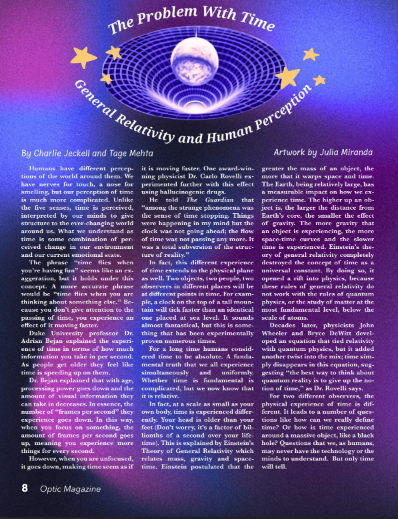
Humans have different perceptions of the world around them. We have nerves for touch, a nose for smelling, but our perception of time is much more complicated. Unlike the five senses, time is perceived, interpreted by our minds to give structure to the ever-changing world around us. What we understand as time is some combination of perceived change in our environment and our current emotional state.
The phrase “time flies when you’re having fun” seems like an exaggeration, but it holds under this concept. A more accurate phrase would be “time flies when you are thinking about something else.” Because you don’t give attention to the passing of time, you experience an effect of it moving faster.
Duke University professor Dr. Adrian Bejan explained the experience of time in terms of how much information you take in per second. As people get older they feel like time is speeding up on them.
Dr. Bejan explained that with age, processing power goes down and the amount of visual information they can take in decreases. In essence, the number of “frames per second” they experience goes down. In this way, when you focus on something, the amount of frames per second goes up, meaning you experience more things for every second.
However, when you are unfocused, it goes down, making time seem as if it is moving faster. One award-winning physicist Dr. Carlo Rovelli experimented further with this effect using hallucinogenic drugs.
He told The Guardian that “among the strange phenomena was the sense of time stopping. Things were happening in my mind but the clock was not going ahead; the flow of time was not passing any more. It was a total subversion of the structure of reality.”
In fact, this different experience of time extends to the physical plane as well. Two objects, two people, two observers in different places will be at different points in time. For example, a clock on the top of a tall mountain will tick faster than an identical one placed at sea level. It sounds almost fantastical, but this is something that has been experimentally proven numerous times.
For a long time humans considered time to be absolute. A fundamental truth that we all experience simultaneously and uniformly. Whether time is fundamental is complicated, but we now know that it is relative.
In fact, at a scale as small as your own body, time is experienced differently. Your head is older than your feet (Don’t worry, it’s a factor of billionths of a second over your lifetime). This is explained by Einstein’s Theory of General Relativity which relates mass, gravity and space-time. Einstein postulated that the greater the mass of an object, the more that it warps space and time. The Earth, being relatively large, has a measurable impact on how we experience time. The higher up an object is, the larger the distance from Earth’s core, the smaller the effect of gravity. The more gravity that an object is experiencing, the more space-time curves and the slower time is experienced. Einstein’s theory of general relativity completely destroyed the concept of time as a universal constant. By doing so, it opened a rift into physics, because these rules of general relativity do not work with the rules of quantum physics, or the study of matter at the most fundamental level, below the scale of atoms.
Decades later, physicists John Wheeler and Bryce DeWitt developed an equation that tied relativity with quantum physics, but it added another twist into the mix; time simply disappears in this equation, suggesting “the best way to think about quantum reality is to give up the notion of time,” as Dr. Rovelli says.
For two different observers, the physical experience of time is different. It leads to a number of questions like how can we really define time? Or how is time experienced around a massive object, like a black hole? Questions that we, as humans, may never have the technology or the minds to understand. But only time will tell.
